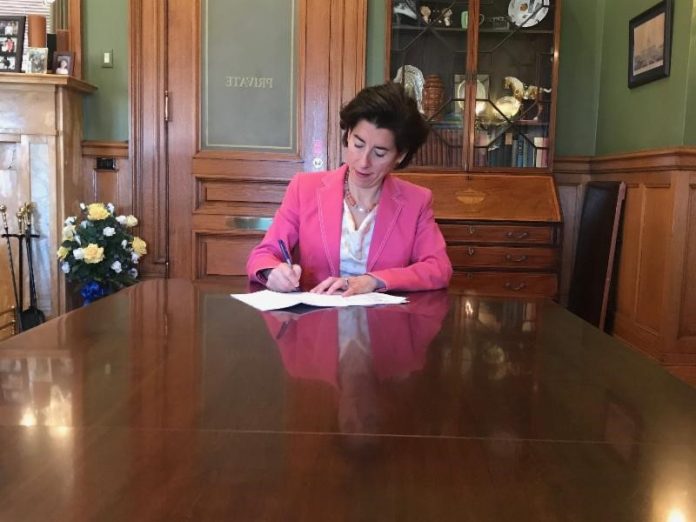PROVIDENCE – Gov. Gina M. Raimondo vetoed three bills approved by the General Assembly on Thursday, describing two as well-intentioned but potentially damaging, and one as unnecessary.
The bills rejected by the governor include the following: 2018-H 7909 Substitute A, which related to surplus lines insurance; 2018-H 8352, which concerned the abuse or isolation of elders and dependent adults; and 2018-S 2442, which would have added marijuana cultivation to the list of issues that have to be included in real estate disclosures.
The House bills vetoed by Raimondo can be reworked and reintroduced in the next session, she said, in her veto message.
The first, relating to surplus lines insurance, would have added a provision to state law that requires bills that are owed to brokers by producing agents not be due any earlier than 45 days after a month in which a transaction occurs. Raimondo said the current law allows for a cancellation of a policy within 10 days of notice of nonpayment to a surplus lines broker.
Although well-intentioned, and meant to help local insurance agents and consumers, Raimondo said she had heard from insurance brokers, carriers and some local agents that the time frame allowed in the legislation might be too long.
The second House bill she vetoed concerned criminal offenses that involve the abuse or exploitation of elderly and dependent adults. The bill established the abuse or isolation of an elder or dependent adult as a felony, punishable by prison up to three years and/or a fine of $3,000.
Although abuse, manipulation and exploitation of elderly and dependent adults is deplorable, Raimondo wrote, in her veto message, advocates for this population had raised concerns about unintended consequences in the proposal.
Among other issues, advocates are concerned “the criminalization included in the bill will deter volunteer guardians that are needed to care for elders and dependent adults who are not able to live independently, and also do not have other caregivers.”
The bill criminalized isolation, which was defined broadly to include restricting phone calls for any duration of time, even potentially exploitative calls, Raimondo wrote.
Finally, Raimondo vetoed a Senate bill, and did not call for its reintroduction with revisions. That measure would have required a written disclosure to potential home purchasers if a house had ever been used for marijuana cultivation. The legislation would not strengthen existing protections for home buyers, Raimondo said, because the main concerns from marijuana grow operations – mold or water damage, or electrical system tampering – are already required to be disclosed under state law.
The bill had drawn opposition from parties including the American Civil Liberties Union Rhode Island chapter, the Rhode Island Association of Realtors and the Rhode Island Patient Advocacy Coalition.
Mary MacDonald is a staff writer for the PBN. Contact her at macdonald@pbn.com.













